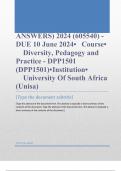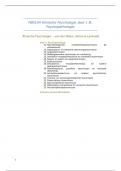Exam (elaborations)DPP1501
Assignment 2 (COMPLETE
ANSWERS) 2024 (605540) -
DUE 10 June 2024• Course•
Diversity, Pedagogy and
Practice - DPP1501
(DPP1501)•Institution•
University Of South Africa
(Unisa)
[Type the document subtitle]
[Type the abstract of the document here. The abstract is typically a short summary of the
contents of the document. Type the abstract of the document here. The abstract is typically a
short summary of the contents of the document.]
[Pick the date]
, Exam (elaborations)
DPP1501 Assignment 2 (COMPLETE ANSWERS) 2024
(605540) - DUE 10 June 2024
Course
Diversity, Pedagogy and Practice - DPP1501 (DPP1501)
Institution
University Of South Africa (Unisa)
Book
Diversity Pedagogy
DPP1501 Assignment 2 (COMPLETE ANSWERS) 2024 (605540) - DUE 10
June 2024 ; 100% TRUSTED workings, explanations and
solutions..........................................
Question 1 THEME: INFUSE AFRICAN EPISTEMOLOGIES AND
PHILOSOPHIES WITHIN THE PQM 1.1 Read the following scenario in order
to answer the questions that follow. Various options are provided in the box
below the scenario, to help you answer the questions. Please choose the
relevant answers to the questions asked. Scenario: Imagine a primary school
in a culturally diverse community, where learners come from various
backgrounds, including African cultures. The school is committed to creating
an inclusive education environment that respects and integrates diverse
epistemologies, including those from African cultures. The goal is to foster a
sense of belonging and enhance the educational experience for all learners.
The school administration is seeking ways to infuse African epistemologies
into the curriculum and overall school culture. Answer options: Please
CHOOSE relevant answers from this box, to answer question 1.1.1 to 1.1.8 -
Encourage open dialogue with learners, parents and the staff, to address
concerns and misconceptions, fostering a culture of understanding and
respect. - Host cultural events, celebrations, or exhibitions that showcase the
richness of African cultures and promote community engagement. - Develop
themes that focus specifically on African cultures, history and contributions,
ensuring that learners encounter these perspectives consistently. - Build a
diverse library, with books, multimedia and online resources that accurately
, represent African cultures, history and achievements. - Expect increased
learner engagement, as diverse perspectives become integral to the learning
experience. - Provide workshops on African cultures, histories and
epistemologies, to enhance teachers' cultural competency.
DPP1501/102/0/2024 7 - Infuse African epistemologies into various subjects,
such as history, literature, science and art, to offer a comprehensive
understanding of diverse perspectives. - Provide regular feedback to learners
and parents, emphasising progress and areas for improvement in a
constructive manner. - Designate specific days or weeks to celebrate different
cultures, including those from African backgrounds, with engaging activities
and events. - Partner with experts, scholars, and community members, to
develop or review learning materials for cultural accuracy. - Organise
workshops to involve parents in understanding the school's approach and to
gather insights into cultural nuances. - Incorporate alternative assessments,
such as project-based assessments or oral presentations, that align with
diverse learning styles. - Encourage teachers to collaborate and share
effective strategies for incorporating diverse perspectives in the classroom. -
Seek guidance from cultural experts, to ensure that the integration is
respectful, accurate and free from stereotypes. - Use inclusive language and
imagery that reflects the diversity of the learner body in school
communications and materials. Please answer the following questions based
on the scenario above.
Questions: 1.1.1 Curriculum integration: (a) How can the school integrate
African epistemologies into the existing curriculum, across different subjects?
(2) (b) Are there specific subjects or topics where African epistemologies
could be particularly impactful? (2)
1.1.1 Integration of the curriculum: (a) African epistemologies can be
incorporated into the school's existing subject-specific curriculum by:
Implanting African epistemologies into different subjects, like history,
writing, science, and workmanship, to offer a thorough comprehension
of assorted viewpoints. Creating topics that attention explicitly on
African societies, history, and commitments, guaranteeing that students
experience these points of view reliably. Building a different library with
books, mixed media, and online assets that precisely address African
societies, history, and accomplishments. encouraging teachers to work
together and share successful methods for incorporating different
points of view in the classroom. (b) Explicit subjects or themes where






